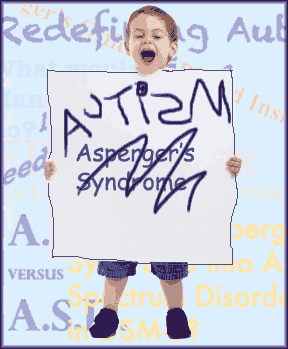Asperger's Syndrome
The Case Against Asperger's
It can be reasonable or disingenuous, inclusive or segregationist.
Posted October 21, 2012

Making the case against the Asperger's dx
It seems likelier than not that the Asperger’s diagnosis will disappear from the Diagnostic and Statistical Manual of Mental Disorders (DSM). Seven months from now, the DSM-5 will be with us, and Asperger syndrome technically won’t.
Actually, it’s hard to be sure about the date, since sticking to the publication timeline has not proven a strength of the American Psychiatric Association. (May we diagnose an institutionalized executive function disorder? Or abulia, the neurological term for loss of drive?)
Outside the APA, the case against Asperger’s as a diagnosis has intriguingly crossed party lines. Many who advocate for the acceptance of autism have reached the same conclusion as some of the pro-cure factions: Asperger’s must go! This is a startling phenomenon the like of which we might never see again. And their reasons, needless to say, are exactly opposite. I’m with the Asperger’s must stay! party, and later I’ll explain why. But here’s the case against, as I understand it — and please weigh in if I miss your particular Asperger’s peeve or if you disagree with my ratings. Inevitably, some of these arguments overlap.
AGAINST: The defining criteria of the autism subtypes, including Asperger syndrome, are vague and subjective, an obstacle to research and diagnosis.
It’s hard to argue with this. Somewhere, I suppose, there might be devoted supporters of the DSM-IV autism-related criteria. But they don’t even have a Facebook page, so who can take them seriously?
The consensus: the DSM-IV approach to autism isn’t working well. Clinicians have complained (and research has shown) that differences between the autistic subtypes are largely subjective. Which means your diagnosis might be influenced by what your clinician had for breakfast or the Korean boy band track the kids insisted on in car pool. To accurately diagnose the various forms of autism would require a Sorting Hat of the Hogwarts type, with all its unfathomable wisdom, announcing of each client, “Asperger’s,” or “PDD-NOS,” or “Autistic Disorder!,” and never to be second-guessed.
Instead, the APA has applied its own special magic and conjured up the supposedly all-embracing Autism Spectrum Disorder.
Whether the new criteria improve on the old ones is beyond the scope of this blog post (though here’s an excellent evaluation). Nevertheless, the old ones were problematic enough that the APA had a strong case for making revisions. Strangely, though, it wasn’t strong enough for the APA, and several members of the autism committees threw in additional, more objectionable rationalizations, which I'll get to later. The result? Much clashing of wands and broomsticks, and suspicions that perhaps the motives of the APA were more sinister than at first appeared. I give this argument 3/5. Would have been 4/5 if the APA had handled it more persuasively.
AGAINST: Asperger’s is separatist and elitist, the label of choice for those distancing themselves from classic autism. In the same vein, mainstream media and pop culture have bestowed on Asperger’s syndrome benign, even flattering stereotypes (quirky geniuses and the like), promoting the acceptance of a small percentage of autistic people while most are still largely excluded.
Like when the coolest kid pals up with a token nerd (the cute one) in a smug display of reasonableness, but continues to persecute the others. This is the argument of many self-advocates associated with the neurodiversity movement. It’s a real issue, but does it justify abolishing Asperger’s?
Maybe the recent cultural prominence of Asperger’s promotes a more mature lay understanding of autism and of developmental conditions, helping to shatter the myth that autism is disastrous. I accept that it’s a fine line, and fine lines are not easily drawn in our impulsive, melodramatic 24/7 news cycle. But still. Roy Richard Grinker, anthropologist and autism researcher, has said the Asperger’s diagnosis “broadened the public understanding of autism as a spectrum,” and “helped previously undiagnosed adults to understand their years of feeling unconnected to others, but without bestowing what was considered the stigma of autism.” He concluded, though, that Asperger’s has done its work, and the stigma of autism is no longer severe enough to justify retaining the Asperger’s diagnosis. I know self-advocates who agree with his conclusion but nevertheless protest his idea that the stigma around autism has seriously diminished. Implicitly, his initial argument remains valid. I appreciate the inclusionary instinct, though, so give this 3.5/5.
AGAINST: The separate Asperger’s category suggests it is a “mild” form of autism, and its challenges mild also.
This “mildness” is a false Asperger stereotype. It minimizes the challenges faced by Aspergerians and their need for support and accommodations. And it reinforces the false dichotomy of “high/low functioning” autism. Autism is a complex, multi-dimensional condition. Its highly variable manifestations don’t necessarily correspond in a codifiable way with degrees of severity or need. Many Aspergerians face profound struggles in multiple areas of life, including relationships, education, employment, housing and health.
Again, a real issue – but the abolition of the label doesn't necessarily resolve it, and could introduce equivalent problems. 2.5/5.
AGAINST: Asperger’s isn’t autism anyway.
This tends to come from pro-cure advocates representing classically autistic people. Their argument: anyone who can effectively self-advocate is not disabled enough to be autistic. Here's autism campaigner Lenny Schafer leading the charge against Aspergerians: "let us hope that the upcoming DSM-V gets clearer about defining autism only as a disability -- and kicks the high functioning ND [neurodiversity] autism squatters onto the personality disorder spectrum where they belong."
My Aspergerian friend Phil, a well-connected advocate, describes the attempt to disenfranchise those with "lesser" forms of autism as "a sort of perversion of Groucho Marx's famous quip that he wouldn't ever belong to a country club that would have him as a member. The perversion is that ‘anybody who can effectively self-advocate is ipso facto not disabled enough to be considered truly autistic’ and should be voted off the island, through reclassification if by no other means.”
The case that Asperger’s isn’t autism seems to be based on misunderstandings of autism, the perception that neurodiversity-based arguments do not address some of the challenges associated with “classic” autism, and (well-grounded) fears around insufficient resources. I score this at 0.5/5. That half point represents my sympathy around the general struggle for services.
Politics aside (or, at least, not exactly central), there’s a case being made that Asperger syndrome sometimes isn’t autism, or autism as we must come to understand it. A study analyzing the impact of the new criteria suggests 10% of the children who'd receive a diagnosis under DSM-IV requirements would not qualify under DSM-5. The new criteria seem likely to exclude those whose language struggles are largely pragmatic.
Which brings us to....
AGAINST: The Asperger’s diagnosis has been too liberally applied, pathologizing social awkwardness and straining educational budgets.
To do this justice, it needs its own post. Next time.




